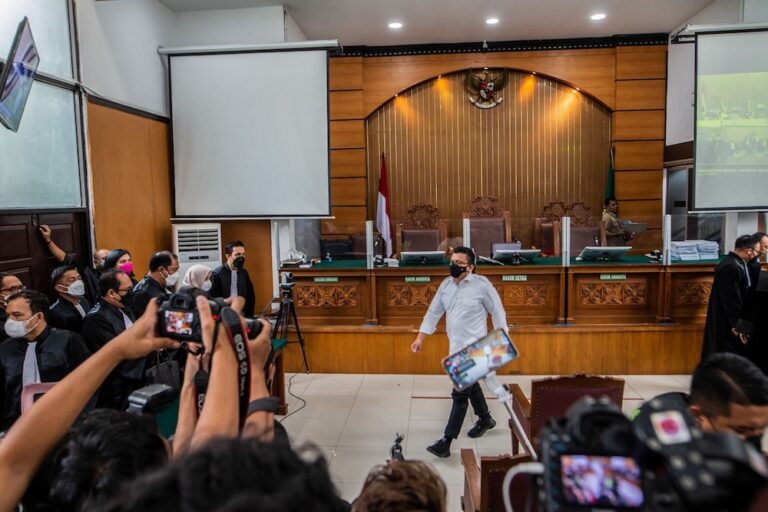(AJI/IFEX) – The following is a joint statement by 22 IFEX members and one other organization: JOINT STATEMENT We, members and partners of the International Freedom of Expression eXchange (IFEX) participating in a General Meeting in Montevideo, Uruguay, issue this joint statement concerning the ruling in the case of “Time Magazine” versus former president Suharto, […]
(AJI/IFEX) – The following is a joint statement by 22 IFEX members and one other organization:
JOINT STATEMENT
We, members and partners of the International Freedom of Expression eXchange (IFEX) participating in a General Meeting in Montevideo, Uruguay, issue this joint statement concerning the ruling in the case of “Time Magazine” versus former president Suharto, a ruling that poses a serious threat to press freedom in Indonesia.
We condemn the ruling issued by the Supreme Court of the Republic of Indonesia, which accepted a lawsuit filed by former president Suharto over a news report on the fortune of Suharto’s family published in “Time Magazine”. In the 30 August 2007 ruling, “Time Magazine” is required to publish an apology in national and international media and to pay one trillion rupiah (approx. US$ 110 million) for material losses.
We regard this ruling to be a direct threat by a judicial institution to freedom of the press and access to public information in Indonesia. The ruling could be used as a precedent by which to bankrupt national mass media outlets when they are brought to court.
The 24 May 1999 edition (Volume 153, Number 20) of “Time Magazine” published a report on the fortune of Suharto entitled “Suharto Inc.: How Indonesia’s Long-Time Boss Built a Family Fortune”. The article was released amidst public demands that the assets of Suharto’s family be traced and amidst the efforts of the reform-era- government to eradicate corruption, collusion and nepotism. The magazine was later brought to court by Suharto for allegedly damaging his reputation.
At the first and second court levels, the Central Jakarta District Court and the Jakarta High Court turned down the lawsuit. However, the Supreme Court, the highest judicial institution in Indonesia, championed Suharto’s lawsuit instead, and overturned the rulings of the two lower courts. The Supreme Court ruling demonstrates the fear the name Suharto instills in judges.
In a previous case, that of “Tempo” magazine versus Tomy Winata, the Supreme Court showed its integrity as a judicial institution by defending press freedom from thuggery. In the case of “Time Magazine”, however, the court has failed to safeguard its judicial dignity from corruption and fear of the powerful.
We regard the ruling by the Supreme Court to be an unreasonable, inconsistent decision and a threat to the efforts of the country’s citizens to defend press freedom and the public’s right to information. Furthermore, we believe the ruling will spread fear among journalists and media outlets, leading to self-censorship when it comes to criticism of authority. The ruling has also tarnished the image of the country in terms of freedom of the press and expression and undermined its attempts to achieve democracy.
Montevideo, 11 October 2007
Signed By:
Arab Network for Human Rights Information (HRinfo), Egypt
ARTICLE 19, United Kingdom
Bahrain Center for Human Rights (BCHR), Bahrain
Center for Human Rights and Democratic Studies (CEHURDES), Nepal
Center for Journalism in Extreme Situations (CJES), Russia
Center for Media Freedom and Responsibility (CMFR), Philippines
Centro de Periodismo y Etica Publica (CEPET), Mexico
Centro de Reportes Informativos sobre Guatemala (CERIGUA), Guatemala
Conseil national pour les libertés en Tunisie (CNLT), Tunis
Egyptian Organization for Human Rights (EOHR), Egypt
Free Media Movement (FMM), Sri Lanka
Freedom House, United States of America
Globe International, Mongolia
Institute for Reporter’s Freedom and Seafety (IRFS), Azerbaijan
International Federation of Journalists (IFJ), Belgium
Instituto Prensa Y Sociedad (IPYS), Peru
Mizzima News, India
National Union of Somali Journalists (NUSOJ), Somalia
Sindicato de Periodistas del Paraguay (SPP), Paraguay
South East Asia Press Alliance (SEAPA), Thailand
World Press Freedom Committee (WPFC), United States of America
West African Journalists Association (WAJA), Mali
World Association of Newspapers (WAN)


